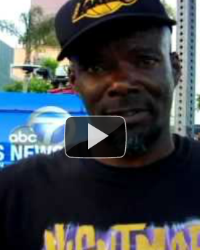Lawrence Taylor, former New York Giant, hall of famer and the original “LT” faces a four year prison sentence for the third degree rape of a 16 year old prostitute. Taylor joins a slew of recent defamed athletes from the professional sporting world in what will surely become a very public trial of his character. We were starting to get over Tiger Wood’s incredibly publicized fall from grace in November, we were in the midst of two time super bowl winner Ben Roethlisberger’s suspension for allegedly showing his genitals to a woman in a bar and now we have the “LT rape trial”.
Now the NFL and Roger Goodell will certainly issue some statement this week about “Deplorable actions” and how the NFL “would never condone this sort of activity”. The NFL will act politically to distance themselves from the situation, wait for the verdict and give the general impression that they hate this sort of stuff. They of course do not hate this sort of stuff, crime is often great for sports.
Crime for a sport-star meets the same ends as a movie starring an athlete, in essence it is the inverse of “Space Jam” but it achieves similar goals. Instead of showcasing an athlete next to Bugs Bunny, the professional is instead shown in mugshots and courtrooms, but he is still being exposed. Guilty or not guilty when a sports star commits a crime it gives him and the sport a lot of unearned attention. The real key for modern professional sports is the intersection between Celebrity and Sport; criminal activity is serving that end.
Professional sports, after all, are not totally about the game, the game are half the point (the carrot) and the massive advertising campaign encircling sports the other (the stick). Sporting stars often make more money from endorsements than from directly playing the game, teams often make more money from their television contracts than their attendance.
Athletes, like celebrities, are having their personal lives showcased for entertainment as if the fact is that to be entertaining on the field (or on screen) means that every aspect of your life is entertaining . Famous NFL “badboy” Terrel Owens recently had a reality television show showcasing his inability to hold stable relationships, the “thrill” of being signed by the Buffalo Bills and best of all a meet up with his estranged father (a married man who impregnated his mother, his next door neighbor at the time).
This is the broad demographic brand of athlete the NFL, MLB and NBA have been trying to cultivate for many years. The utility of an athlete is beyond simple route running, fast pitching or baseline shooting. The athlete sells us cars, cell phones, deodorant, soda, candy bars, and weight loss regimens. Its not logical to think that Michael Jordan really knows anything about cars, but his endorsement of the Chevy Blazer in the nineties helped to proliferate the SUV in the nineties.
Jordan, of course, was not above reproach as far as unseemly behavior goes. His unfaithfulness to his former wife as well as his gambling addiction have been well publicized . . . after his retirement. Kobe Bryant lost a 11 million dollar McDonald’s endorsement when he was accused of the rape of a 19 year old girl, Jordan has not once been dropped from a sponsorship. Tiger Woods has reportedly lost 180 million in endorsements after Tag Huer, AT&T and Gatorade (among others) dropped their respective endorsements of him.
There is money to be lost by the athlete in these cases, but that is not to say that their respective leagues or teams suffered. The LA Lakers have averaged an attendance of 18,911 in the last ten years in a stadium that hold 18,977. Kobe’s Jersey is still the second highest selling in NBA history. Ratings for the PGA suffered in the wake of the “Tiger takes time for family” furlough, only to receive record viewership during his return at this years Masters.
The fact is that controversy increases activity on professional sports websites (currently the LT story is on the front page of NFL.com) and viewership (the Lakers tied an attendance record and a ratings record in 2003-2004). When “E”, “Extra”, or “Entertainment Tonight” (the antithesis to sports center) cover sports, sports are reaching a broad demographic. Sports reach this broad demographic almost always as a result bad behavior. When hall of fame caliber athletes break the law or societal norms they become valuable interest. TMZ, the paparazzi clip empire, recently announced that it will be launching an all sports site to give you the same in depth coverage of athletes that can only be garnered by rushing a person on the street and yelling non-sense at them.
Controversy may, at times, have adverse affects. The steroid issue in baseball certainly may have had a negative impact on baseball. When Henry Waxman, congressman from California, initiated a probe in to baseball (during the housing meltdown) it became front page news. This is the same sort of broad attention created from any bad behavior in sports, but the difference is it was dealing with the integrity of the sport, not just the integrity of a person playing it. Kobe, Mike Vick and Tiger all had off the playing field crisis-es in conscience. Baseball instead had an entire era of the sport questioned. There is a cloud above every productive player in the last twenty years because of the steroid hearings, and many would be hall of famers will have their entire legacies shaken. The holy grail of the MLB had been Hank Aaron’s home run record and when Barry Bonds broke the record after admitting to steroid use a colossal sporting event was widely seen viewed as illegitimate.
What should have been a huge event for the sport was mired in the controversy that the record was being broken by someone who cheated to do it. That is certainly a loss for the MLB.
But the fact remains that the roidball era pulled the MLB out of its nadir. The single season home run race in 1998 between Sammy Sosa and Mark Mcguire was the one catalyst that changed the momentum of baseball after its lost 1994 season due to a player’s union strike. That time, the heart of the roidball era, was so important in increasing attendance and interest in the dying sport that it is easy to juxtapose the controversy that occurred years after it to the impact the era had as a net gain. It would certainly have been a different story if the steroid news broke during the late nineties baseball return to form, but having it break 8 years after the fact meant that many of the players involved had retired and very few players have been suspended since 2005 for breaking the steroid ban (22 total) and even fewer of them were big name players.
And as for Lawrence Taylor, he will surely receive a lot of attention for cheating off the field and not on it (Steroids is cheating off the field to cheat on it, LT ordering a 16 year old prostitute is just cheating on his own soul). Taylor was convicted of cocaine possession in his past so his reputation may be damaged by the rape charge, but damaged in the way you can damage a vase that you have glued together once.
It’s always been an opinion of mine that the utility of a sports star to me is that they can play the sport. I am interested in how they play the game and what they do on the field, I am not swayed by what deodorant Dwayne Wade uses or whether or not a player is a “Good Guy”. But that of course will not keep me from getting updates on the LT news and to be honest, when I heard the news break today my first instinct was to go to NFL.com and hear the company line. In the end I guess I would just like to remember LT for what he should really be known for; shattering Joe Theisman’s leg.




Next time you should shorten your post, try to leave out the parts that people ignore.